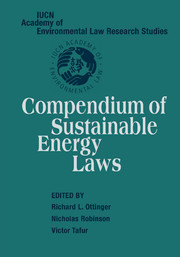Book contents
- Frontmatter
- Contents
- Acknowledgments
- Introduction
- I WORLD ENERGY ASSESSMENT
- II INTERNATIONAL AGREEMENTS
- III INTERNATIONAL LAW DECLARATIONS AND OTHER SOFT LAW INSTRUMENTS
- Universal Declaration of Human Rights
- Millennium Declaration
- Stockholm Declaration of the United Nations Conference on the Human Environment
- Declaration on the Right to Development
- World Charter for Nature
- Rio Declaration on Environment and Development
- The Earth Charter (As endorsed by UNESCO and IUCN)
- IV ACTION PLANS AND MULTILATERAL OPERATION RECOMMENDATIONS
- V SELECT REGIONAL INTERNATIONAL ENERGY AGREEMENTS
- VI SELECT NATIONAL LEGISLATION ILLUSTRATIVE OF SUSTAINABLE ENERGY LAW INNOVATIONS
- Index
Millennium Declaration
Published online by Cambridge University Press: 03 May 2010
- Frontmatter
- Contents
- Acknowledgments
- Introduction
- I WORLD ENERGY ASSESSMENT
- II INTERNATIONAL AGREEMENTS
- III INTERNATIONAL LAW DECLARATIONS AND OTHER SOFT LAW INSTRUMENTS
- Universal Declaration of Human Rights
- Millennium Declaration
- Stockholm Declaration of the United Nations Conference on the Human Environment
- Declaration on the Right to Development
- World Charter for Nature
- Rio Declaration on Environment and Development
- The Earth Charter (As endorsed by UNESCO and IUCN)
- IV ACTION PLANS AND MULTILATERAL OPERATION RECOMMENDATIONS
- V SELECT REGIONAL INTERNATIONAL ENERGY AGREEMENTS
- VI SELECT NATIONAL LEGISLATION ILLUSTRATIVE OF SUSTAINABLE ENERGY LAW INNOVATIONS
- Index
Summary
VALUES AND PRINCIPLES
We, heads of State and Government, have gathered at United Nations Headquarters in New York from 6 to 8 September 2000, at the dawn of a new millennium, to reaffirm our faith in the Organization and its Charter as indispensable foundations of a more peaceful, prosperous and just world.
We recognize that, in addition to our separate responsibilities to our individual societies, we have a collective responsibility to uphold the principles of human dignity, equality and equity at the global level. As leaders we have a duty therefore to all the world's people, especially the most vulnerable and, in particular, the children of the world, to whom the future belongs.
We reaffirm our commitment to the purposes and principles of the Charter of the United Nations, which have proved timeless and universal. Indeed, their relevance and capacity to inspire have increased, as nations and peoples have become increasingly interconnected and interdependent.
We are determined to establish a just and lasting peace all over the world in accordance with the purposes and principles of the Charter. We rededicate ourselves to support all efforts to uphold the sovereign equality of all States, respect for their territorial integrity and political independence, resolution of disputes by peaceful means and in conformity with the principles of justice and international law, the right to self-determination of peoples which remain under colonial domination and foreign occupation, non-interference in the internal affairs of States, respect for human rights and fundamental freedoms, respect for the equal rights of all without distinction as to race, sex, language or religion and international cooperation in solving international problems of an economic, social, cultural or humanitarian character.
[…]
- Type
- Chapter
- Information
- Compendium of Sustainable Energy Laws , pp. 85 - 90Publisher: Cambridge University PressPrint publication year: 2005



